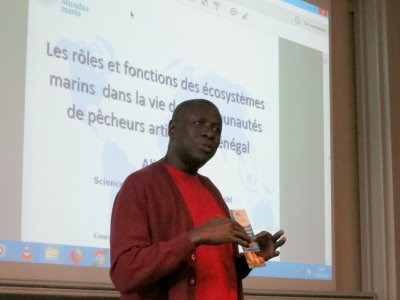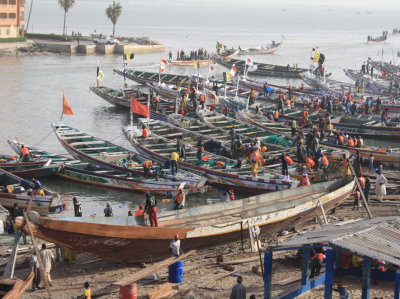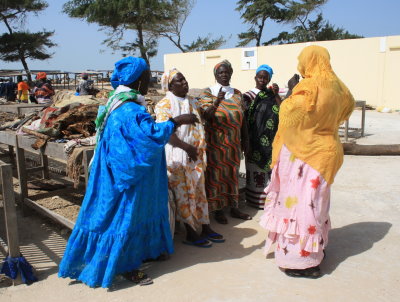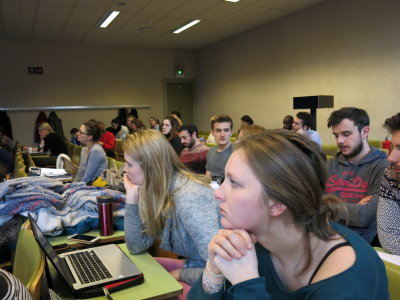 In collaboration with ULB-Coopération, Aliou Sall of Mundus maris offered a free course, 15 March 2018, to the Master students of Prof Nathalie Gypens striving to understand multiple roles of aquatic and agricultural ecosystems and how they can be managed for sustainable use. The emphasis was on the dependence of small-scale fishers on ecosystem services for their livelihoods and the multiple challenges they face.
In collaboration with ULB-Coopération, Aliou Sall of Mundus maris offered a free course, 15 March 2018, to the Master students of Prof Nathalie Gypens striving to understand multiple roles of aquatic and agricultural ecosystems and how they can be managed for sustainable use. The emphasis was on the dependence of small-scale fishers on ecosystem services for their livelihoods and the multiple challenges they face.
The Master course is open to students from a wide array of backgrounds and aims to provide an overview rather than in depth analysis of specific ecosystems or management models. Aliou Sall therefore recalled at least summarily the origin of marine ecosystem research and the meaning of marine food chains or food webs and what trophic levels are.
He then highlighted a few key features of the two major marine ecosystems in the north west African countries cooperating under the umbrella of the Sub-Regional Fisheries Commission, namely Mauritania, Senegal, Gambia, Cape Verde, Guinea Bissau, Guinea and Sierra Leone.
Turning to the services that these ecosystems provide, he focused primarily on the multiple services to the hundreds of thousands of people revolving around small-scale (commercial) fisheries with their many anxillary jobs and businesses and the consumers of highly appreciated traditional smoked, dried or fermented products marketed over a wide region of the Sahel and into the hinterland further south.
 In the face of stiff competition from industrial fleets the artisans of the sea see their future jeopardised because many of the industrial operations are illegal and never even recorded in the official statistics of under-resourced national services.
In the face of stiff competition from industrial fleets the artisans of the sea see their future jeopardised because many of the industrial operations are illegal and never even recorded in the official statistics of under-resourced national services.
Independant research estimates the percentage of extraction through illegal, unregistered and unregulated fishing as close to half of the total. The officially registered part of the catches is split approximately evenly between small-scale and industrial fishers.
The excessive fishing pressure has led to serious changes in ecosystem structure and functioning as formerly abundant high-value bottom-living fish species are commercially extinct. Invertebrate species becoming more abundant as a result of overfishing of finfish are themselves now becoming over-exploited.
The fish species which have best resisted the heavy fishing are so-called small pelagics, such as mackerel, horse mackerel, sardines, sardinellas and bonga shad.
These largely depend on abundant upwelling of nutrient-rich deep water, which fertilise the upper layers of the ocean. These small pelatig fish develop large schools in seasonal bursts, when their food, composed of micro-algae and the zooplanktion feeding on them, bloom in the upwelling. Warming seas affect the regional distribution of these short-lived species and accentuate the changes in catch composition and availability. This increases the uncertainty under which the fishers operate.
 The answer of the small-scale fishers is to increase fishing effort and innovate: on the side of fishing at sea, boats have mostly increased size and thus also need more powerful outboat engines, the numbers have increased and greater precaution is being taken against accidents by safety equipment, such as gps, life vests, mobile phones etc.
The answer of the small-scale fishers is to increase fishing effort and innovate: on the side of fishing at sea, boats have mostly increased size and thus also need more powerful outboat engines, the numbers have increased and greater precaution is being taken against accidents by safety equipment, such as gps, life vests, mobile phones etc.
On the land-based side, especially in processing and marketing fish through traditional channels in national and regional markets, many activities are dominated by women. The export oriented post-harvest activities are conversely often dominated by foreign industrial companies.
The women in turn also innovate as best they can through using improved smoking kilns that use lesser quantities of firewood when they can afford the higher investment. They organise their saving clubs to face expenses due to high prices of raw materials, meeting higher hygiene standards and fighting for better secured to contested space in the coastal zone to exercise their businesses.
 In such a dynamically changing environment, the governments, supported by a regional World Bank project (PRAO), attempt to adjust national and sub-regional policies in favour of restricting fishing effort and reducing overfishing. Unfortunately, these efforts have not benefitted from sufficient research and consultation about pre-existing traditional management systems.
In such a dynamically changing environment, the governments, supported by a regional World Bank project (PRAO), attempt to adjust national and sub-regional policies in favour of restricting fishing effort and reducing overfishing. Unfortunately, these efforts have not benefitted from sufficient research and consultation about pre-existing traditional management systems.
The establishment of Local Artisanal Fisheries Committees legally recognised e.g. by the government in Senegal but not perceived as legitimate among the small-scale fishers (men and women) and their leaders, has exacerbated the crisis of authority, which impedes implementation of the policy reform.
The current deadlock has small-scale fishers openly defying legal and administrative rules e.g. in relation to boat registration and fishing licences, while illegal, largely industrial, fishing undermines the structure and functioning of the entire ecosystems. How to defuse this potentially explosive context? It will certainly need much better marine surveillance of illegal fishing, often going hand in hand with corruption, fraud and other criminal practices.
Rebuilding authoritative institutions both public and rehabilitating conservation oriented traditional management would certainly be beneficial. Rebuilding trust between the administration and the fishers and responding to the demands of the fishers for sharing research results about the functioning of ecosystems are other steps in this direction.
Mundus maris intends to start offering such access to research results and trust-building in the form of a small-scale fisheries academy, not so much a building, but rather a safe space for exchange. All help to make it happen is welcome.
The slides of the course are available here (in French).
Some further reading.
Belhabib, D., Harper, S., Zeller, D., Pauly, D. (eds.), 2012. Marine fisheries catches in West Africa, 1950–2010. Fish.Centre Res.Rep., vol. 20. and updates by country.
Bonfil, R., Munro, G., Sumaila, U.R., Valtysson, H., Wright, M., Pitcher, T., Preikshot, D., Haggan, N., Pauly, D., 1998. Impacts of distant water fleets: an ecological, economic and social assessment. WWF International 11–111.
European Commission, 2005. Rebuilding our marine ecosystems, protecting our future. Key findings of the International Symposium on Marine Fisheries, Ecosystems and Societies in West Africa – Half a century of change, Dakar, Senegal, 24-28 June 2002. Luxembourg: Office for Official Publications of the European Communities, 20p. ISBN 92-894-9166-3 Click here
Text and pictures are by Cornelia E Nauen unless indicated otherwise.
